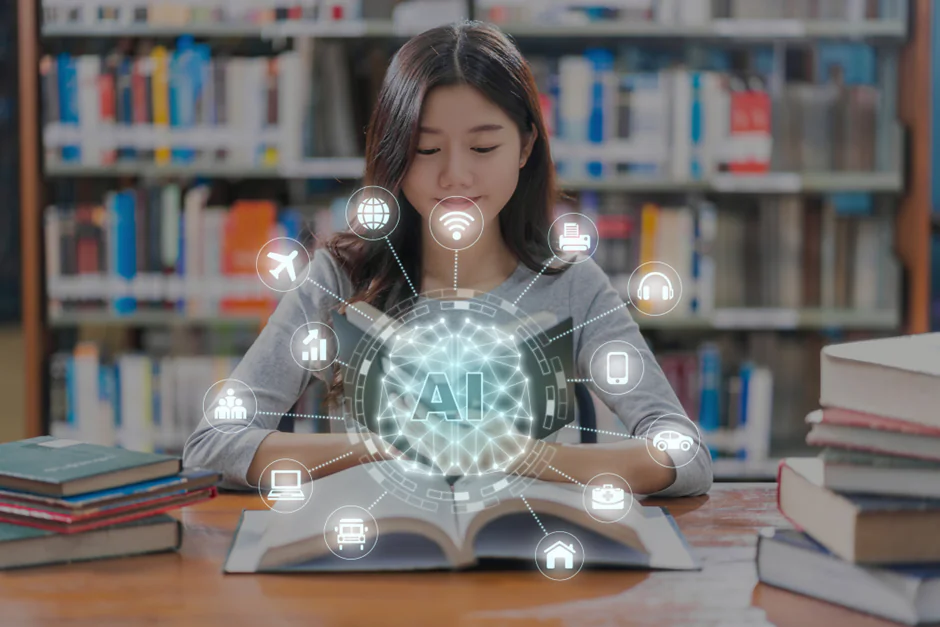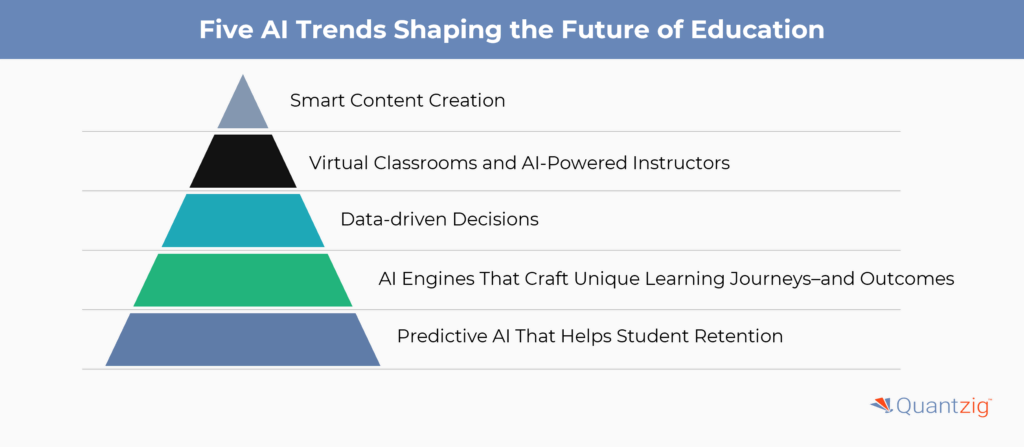Written by: Sudeshna Ghosh
Table of Contents
Key Takeaways from AI Integration in Education
- Empowering Educators and Learners: AI assistants for example, machine learning, natural language processing, robotics, chatbots, and data analytics are empowering educators to deliver more effective and engaging learning experiences.
- Enhancing Efficiency: By automating routine tasks and providing predictive insights, AI is streamlining administrative processes and enabling educators to research more on teaching and less on bureaucratic duties.
- Bridging Gaps in Learning: AI’s predictive analytics and adaptive learning systems using computers are instrumental in identifying and bridging gaps in students’ knowledge. This ensures that every student, regardless of their starting point, has the opportunity to succeed and excel.
- Promoting Lifelong Learning: With AI-driven educational tools and platforms, learning becomes a continuous, lifelong process. AI facilitates this by providing learners with resources that evolve with their educational journey, ensuring that learning never stops.
- Preparing for a Digital Future: As we advance towards an increasingly digital world, AI in education is preparing students not just academically but also equipping them with the necessary digital skills and knowledge to thrive in the future.
Introduction to AI Trends in Education
In the ever-evolving intelligent market of higher education, the infusion of artificial intelligence trends (AI) is not just a technological advance but a pivotal transformation shaping the future of learning. With innovations such as AI engines, virtual content, and smart tutoring systems, the latest AI education is more than just a trend; it’s a fundamental shift in how we approach teaching and learning.
This article explores the significant global Artificial intelligence in education advancements, delving into how they’re revolutionizing learning experiences, from personalized learning paths to smart tutoring systems. As Natural Language Processing (NLP) continues to integrate into educational frameworks, it promises to redefine traditional pedagogical methods, offering learners and educators alike a more adaptive, efficient, and immersive educational journey.
Book a demo to experience the meaningful insights we derive from data through our AI trends in Education and platform capabilities. Schedule a demo today!
Request a Free DemoWhat are AI Trends in Education?
AI (Artificial Intelligence) powered learning tools is revolutionizing education through the integration of Virtual Labs and LMS (Learning Management System) platforms. By leveraging Artificial Intelligence and generative AI solutions, educational institutions can offer data-driven insights and predictive AI capabilities to enhance learning experiences. The AI ed tech market is rapidly expanding, with AI-driven ed tech solutions becoming pivotal in modern education. This transformation through AI technology enables personalized learning, efficient resource management, and innovative teaching methods, redefining what AI in education means.
What are the Types of AI-Powered Learning Experiences?

1. Personalized Learning Experiences
AI engines and data analytics are revolutionizing education by personalizing learning for each student. Adaptive learning platforms, leveraging technologies like ChatGPT and deep learning, analyze performance and preferences to create tailored educational pathways that adjust content accessibility and pace.
Real-time captioning and 24/7 AI tutors improve accessibility and retention, while performance trends optimize curricula. Automation and smart tutoring systems with Natural Language Processing (NLP) enhance IT skills and career paths, creating a customized learning environment that meets individual needs.
2. Intelligent Tutoring Systems
The integration of AI in higher education is revolutionizing the smart classrooms’ experience with Intelligent Tutoring Systems (ITS). These systems, powered by advancements in AI engines, machine learning, deep learning, and data analysis, are redefining the traditional teaching methods. ITS, equipped with AI algorithms, provides real-time information, adapts to individual student progress, and offers targeted support where needed, effectively creating a responsive and interactive learning environment.
These AI-driven systems are designed to understand the nuances of student learning processes. They utilize educational data mining to personalize teaching approaches and learning analytics to monitor student performance. This leads to a more engaging and effective educational experience, catering to the diverse learning styles of college students. Intelligent Tutoring Systems and chatgpt, with their ability to adapt and respond to the learning needs of each student, are pivotal in creating an educational landscape that is dynamic, inclusive, and tailored to foster deep understanding and mastery.
3. Gamification and AI in Education
AI-driven gamification tailors learning to individual styles through predictive analytics, enhancing engagement and effectiveness. It also powers VR/AR, creating immersive environments that bring concepts to life, advancing how education is delivered and experienced.
4. Predictive Analytics for Student Success in Education
The integration of AI in classrooms is revolutionizing education by using machine learning in education and predictive analytics to anticipate students’ needs. Through personalized learning with AI, LMS, and feedback loops, AI enhances grading and curriculum delivery, providing smart, tailored content for each student. This transformation also improves efficiency in AI in K-12 education and AI in online education, benefiting students, teachers, and administrators. However, it raises concerns about data privacy, textbooks, and ethics, requiring careful consideration as AI for teachers and adaptive learning with AI become more prevalent.
5. Harnessing Data for Educational Insights
By harnessing student data, AI-powered systems automate tasks, Automation of tasks and analyze student performance and academic grades. This process, grounded in machine learning and data analytics, empowers educators to tailor personalized learning experiences. It facilitates the identification of factors influencing academic success and streamlines administrative duties through the integration of virtual assistants.
Experience the advantages firsthand by testing a customized complimentary pilot designed to address your specific customer analytics requirements. Pilot studies are non-committal in nature.
Request a Free PilotThe Role of AI in Student Retention

Predictive analytics in education plays a critical role in student retention. By forecasting potential drop-out risks, AI systems allow institutions to proactively engage with at-risk students. This early intervention can include tailored tutoring, simulations, counseling, and academic support, significantly improving student retention rates.
AI technologies, for example, chatbots, cognitive computing and educational data mining, are instrumental in elevating academic performance. They offer predictive insights into student strengths and areas needing improvement, allowing educators to tailor their teaching strategies effectively. This results in a more dynamic educational environment using internet that caters to diverse learning styles and paces.
Five AI Trends Shaping the Future of Education

1. Smart Content Creation
The future of education is poised for a transformative leap with the advent of AI-driven smart content creation. This approach, leveraging the power of natural language processing and machine learning, is set to revolutionize the way educational materials are developed and disseminated.
AI’s advanced algorithms are adept at quickly generating high-quality, relevant, and adaptive learning materials. This not only accelerates the content creation process but also allows educators to channel their efforts into nurturing critical thinking and creativity in students. The potential of AI in customizing content to fit diverse learning needs and styles is immense. It promises to deliver a more engaging and effective learning experience level, tailored to the individual needs of students.
2. Virtual Classrooms and AI-Powered Instructors
Virtual instructors, powered by sophisticated AI technologies, are set to transform the learning experience for students globally. These AI-driven instructors analyze student interactions, respond to queries, and adapt teaching methods in real-time, creating a dynamic and responsive virtual learning environment. AI-powered instructors are not constrained by geographical boundaries, making quality education more accessible to students irrespective of their location. These virtual environments can simulate real-life scenarios, providing an immersive learning experience that traditional classrooms may not offer, enhancing the market growth and market share.
The use of AI in virtual classrooms also extends to language learning, where AI instructors can provide pronunciation corrections, questions, grammar tips, and cultural insights. This personalized guidance is invaluable in mastering a new language, making the learning process both efficient and enjoyable.

3. Data-driven Decisions
Data-driven decisions can enhance student performance and outcomes in the information age. Massive volumes of student data can be sorted through AI, which can then be utilized to optimize your curriculum by revealing performance trends. AI may make recommendations for learning material changes by monitoring how frequently and long students interact with content in their learning management system (LMS), and by examining feedback from students and worldwide academic trends. By tailoring courses to individual student needs and promptly identifying those who require additional support, these insights can lead to individualized results.
4. AI Engines That Craft Unique Learning Journeys–and Outcomes
Learning can no longer be approached with a one-size-fits-all philosophy in the increasingly diverse field of education. This holds for individual student goals preferences and learning modalities. Let AI introduce itself as the creator of customized learning environments.
Global education leaders anticipate that AI engines will create infrastructure to help understand how to connect the dots to alternative credentials and smaller, more modular content experiences by evaluating individual student data, including engagement, completion, and content. These engines could create complex learning paths.
For instance, micro-credentialing may expand to help with this trend. Institutions may direct students toward more optimal and varied success levels if AI engines create course paths and content that speak to specific students.
5. Predictive AI That Helps Student Retention
The decline in enrollment in higher education has long plagued the field. Keeping students who do enroll on track for completion is a related priority that comes second to enrollment.
How can artificial intelligence be useful? AI is now available to institutions to support retention initiatives. For instance, predictive modeling forecasts campus-wide insights for at-risk students by fusing data analytics with generative AI solutions.
Predictive analytics changes the traditional approach to retention interventions, which involves assisting students only after it becomes evident that they require assistance. Administrators can take the initiative instead. And that entails reaching out for assistance before it’s too late.
How can Quantzig help Education Sector with AI Technologies?
Quantzig’s integration of AI in the educational sphere marks a significant step towards elevating education intelligence. By leveraging the power of AI, Quantzig concerns to transform the traditional educational framework into a more dynamic, data-driven, blended learning, and student-centric model. This approach not only enhances the learning experience but also empowers educators to deliver more impactful teaching, make customized lesson plans, provide proper training, and reduce cheating.
In this context, Quantzig’s expertise in AI manifests in several ways:
- Data-Driven Decision Making: Quantzig harnesses AI to provide educators with actionable insights in term of comprehensive data analysis. This empowers team to make smart classrooms, tailor teaching methodologies, and optimize learning scale based on individual student needs and performance.
- Predictive Analytics: Utilizing AI for predictive analytics, Quantzig helps educational institutions identify potential learning and writing gaps and academic risks. This proactive approach enables timely interventions, ensuring that every student receives the necessary support to growth.
- Customized Learning Pathways: AI’s capability to analyze vast amounts of data allows for the creation of personalized learning pathways. Quantzig leverages this to offer students a more tailored educational experience, catering to their unique learning styles, pace, and preferences.
- Enhanced Engagement and Interaction: AI tools developed by Quantzig can facilitate greater student engagement and interaction. Whether through intelligent tutoring systems, gamification, or adaptive content, these AI solutions keep students motivated and actively involved in their learning journey.
- Efficiency and Resource Optimization: AI applications in education go beyond just personalized learning things. They also offer solutions for resource optimization, scheduling, and administrative efficiency, allowing educational institutions and community to allocate their resources more effectively.
Quantzig’s expertise in AI and predictive analytics empowers educational institutions to make data-driven decisions. This approach ensures a tailored educational experience for students, fostering a nurturing and productive learning environment. With Quantzig’s solutions, educators can leverage AI to transform the traditional classroom into a smart, responsive, and adaptive learning space.
Get started with your complimentary trial today and delve into our platform without any obligations. Explore our wide range of customized, data driven AI analytical solutions built across the analytical maturity levels.
Start your Free TrialConclusion: Shaping the Future of Learning with AI
The transformative power of AI in educational technology heralds a new dawn for learning and teaching. As Quantzig continues to pioneer AI integration in educational systems, the landscape of learning is evolving into a more intelligent, adaptive, and personalized experience. This paradigm shift, propelled by AI, is not just a fleeting trend but a fundamental change in how education is delivered and experienced.
In summary, AI’s role in education sector is transformative, creating a dynamic and responsive digital transformation and learning opportunities in subjects such as mathematics educational technology trends. Quantzig’s expertise in AI ensures that the future of education is a harmonious blend of technology and human intellect, paving the way for a smarter, more inclusive, and more effective educational system.



